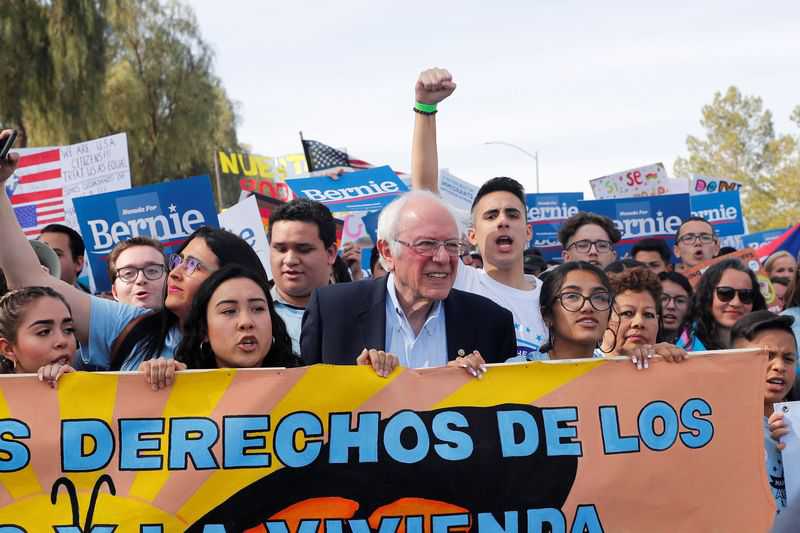Sanders’ bond with Latinos gets 1st test of many in Nevada
17 February, 2020

When the Bernie Sanders for President campaign create shop in NEVADA last July, its first move was to open an office in the city’s east side, the heart of the Latino community. Staffers decorated the stark space with brightly colored paper banners known as “papel picado” and threw an office opening party with a mariachi band and appearance from Sanders himself.
3 x a day canvassers spill out of its doors to walk the streets, knocking on doors, calling out at neighbors in Spanish and talking up Sanders - or as he's recognized to some Latino supporters, “Tio Bernie.”
A self-declared socialist from Vermont, Sanders is sometimes pigeon-holed as the hero to white school students and lefty boomers. But his campaign believes his outreach to different voters, especially Latinos in places like east NEVADA, could be the secret to his success.
That focus was clear Saturday, as early voting kicked off in Nevada. Sanders’ campaign hired a truck with an electronic billboard on the trunk to operate a vehicle around east NEVADA, encouraging Sanders supporters to go cast early caucus ballots.
Four years back, Sanders’ failure to muster enough support from minority voters was partly to blame for his losing the Democratic nomination. These times, he has transformed his outreach to Hispanic voters, hiring high-level Latino advisers, beefing up Spanish-speaking canvassing and digging deep into Latino neighborhoods to find voters available to his populist message.
There are signs that Sanders’ work has begun to pay off. In Iowa, Sanders won two-thirds of the roughly 1,000 votes at caucus locations in majority Latino areas, according to a report by professors at the University of California-Los Angeles. While reliable polling on Latinos is scarce, a Fox News survey of Nevada Democrats in early January found Sanders had better support among Latinos than among whites in the state, tying Biden for the lead among the group.
But the first proper test of the strategy is Nevada’s caucus on Feb. 22, the 3rd contest on the presidential nominating calendar and the first with a big population of Latino voters. Following quickly are California and Texas, states that are 40% Hispanic and represent practically half the delegates up for grabs on so-called Super Tuesday on March 3. Arizona and Florida vote fourteen days later. Strength among Latino voters could serve as a good foundation of support that helps Sanders rack up delegates deep in to the nomination process.
Sanders’ focus on good jobs, single-payer healthcare and free college arises constantly with voters, said Susana Cervantes, his Nevada field director.
“Almost every parent’s dream, especially immigrants, is for their children to access higher education. It represents social mobility, social economic mobility and it’s a the main American dream,” she said.
It wasn’t enough for Sanders to win Nevada in 2016. In its post-defeat autopsy, Sanders’ campaign found it had won the votes of Latinos in nearly every state it competed, albeit sometimes narrowly, said Chuck Rocha, a senior Sanders strategist. It made a decision to build on that foundation.
In his 2020 announcement speech, he stressed his impoverished parents’ immigrant roots to draw a reference to Latino voters only a generation or two away from the immigrant experience. The campaign recruited high-profile surrogates like NY Rep. Alexandra Ocasio-Cortez - who held a Spanish-language town hall in Nevada late last year - and San Juan Mayor Carmen Yulin Cruz. It marshaled Latino supporters from around the united states to send texts in Spanish to Latinos in Iowa, New Hampshire, Nevada and South Carolina, the four early states.
The campaign hired Latinos in high positions across every department, Rocha said. It spent huge amount of money on bilingual communications. Those ads landed on the Latin pop Pandora channels that young Latinos might pay attention to, but also the weekly Spanish-language newspapers and Univision current affairs shows their parents or grandparents read and watch. It all cultivated the image of Sanders within the family - a “tio” or uncle - as the favorite campaign shirt read.
Latinos do not vote as a solid bloc. Families in the Southwest who have lived in the united states for years and years often vote differently from recent arrivals in the Midwest or Cuban immigrants in Florida and New Jersey whose experience with socialist leaders abroad can make them especially suspicious of a applicant who describes himself, as Sanders does, as a socialist.
In 2018, Latinos comprised about 11% of the Democratic electorate. About two-thirds of Latino voters backed Democratic individuals in the midterms, according to AP VoteCast, a national survey of voters for the reason that election.
And even though Sanders’ team believes its applicant has forged a bond with Latinos, polls show they tend to be centrist than non-Hispanic Democrats.
“They’re still more moderate and make the Democratic electorate more moderate than in some other states,” said Gilberto Hinojosa, chairman of the Texas Democratic Party, who noted that many Latinos in his state would not identify as progressives, significantly less socialists.
Source: the-japan-news.com
